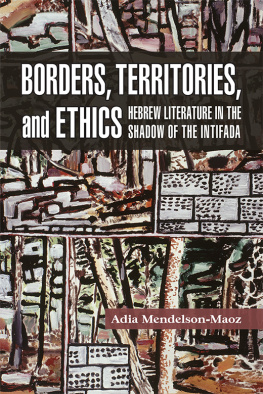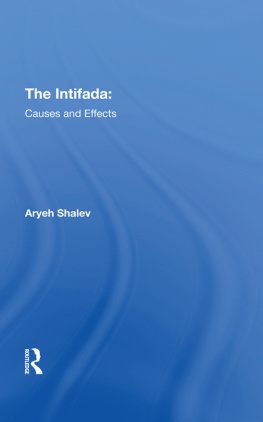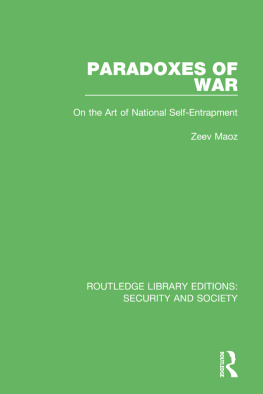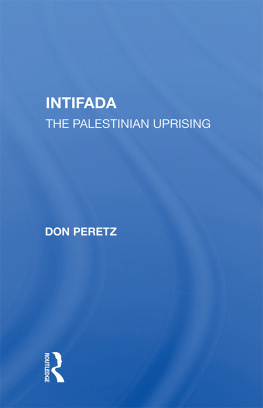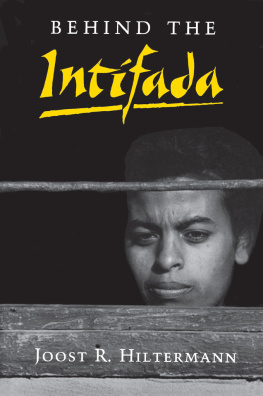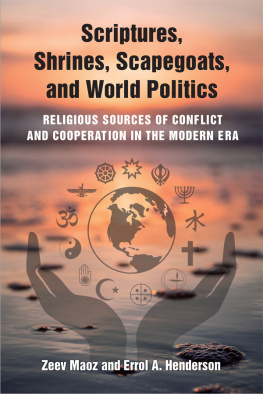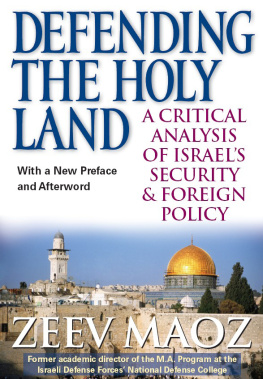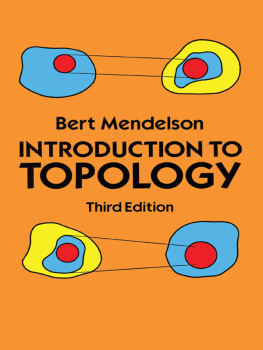Adia Mendelson-Maoz - Borders, Territories, and Ethics: Hebrew Literature in the Shadow of the Intifada
Here you can read online Adia Mendelson-Maoz - Borders, Territories, and Ethics: Hebrew Literature in the Shadow of the Intifada full text of the book (entire story) in english for free. Download pdf and epub, get meaning, cover and reviews about this ebook. year: 2018, publisher: Baker & Taylor Publisher Services (BTPS), genre: Romance novel. Description of the work, (preface) as well as reviews are available. Best literature library LitArk.com created for fans of good reading and offers a wide selection of genres:
Romance novel
Science fiction
Adventure
Detective
Science
History
Home and family
Prose
Art
Politics
Computer
Non-fiction
Religion
Business
Children
Humor
Choose a favorite category and find really read worthwhile books. Enjoy immersion in the world of imagination, feel the emotions of the characters or learn something new for yourself, make an fascinating discovery.
- Book:Borders, Territories, and Ethics: Hebrew Literature in the Shadow of the Intifada
- Author:
- Publisher:Baker & Taylor Publisher Services (BTPS)
- Genre:
- Year:2018
- Rating:5 / 5
- Favourites:Add to favourites
- Your mark:
- 100
- 1
- 2
- 3
- 4
- 5
Borders, Territories, and Ethics: Hebrew Literature in the Shadow of the Intifada: summary, description and annotation
We offer to read an annotation, description, summary or preface (depends on what the author of the book "Borders, Territories, and Ethics: Hebrew Literature in the Shadow of the Intifada" wrote himself). If you haven't found the necessary information about the book — write in the comments, we will try to find it.
Adia Mendelson-Maoz: author's other books
Who wrote Borders, Territories, and Ethics: Hebrew Literature in the Shadow of the Intifada? Find out the surname, the name of the author of the book and a list of all author's works by series.
Borders, Territories, and Ethics: Hebrew Literature in the Shadow of the Intifada — read online for free the complete book (whole text) full work
Below is the text of the book, divided by pages. System saving the place of the last page read, allows you to conveniently read the book "Borders, Territories, and Ethics: Hebrew Literature in the Shadow of the Intifada" online for free, without having to search again every time where you left off. Put a bookmark, and you can go to the page where you finished reading at any time.
Font size:
Interval:
Bookmark:

Shofar Supplements in Jewish Studies
Zev Garber, Editor
Los Angeles Valley College
Adia Mendelson-Maoz
Purdue University Press
West Lafayette, Indiana
Copyright 2018 by Purdue University. All rights reserved.
Printed in the United States of America.
Cataloging-in-Publication data is on file with the Library of Congress.
Paper ISBN: 978-1-557-53820-8
ePDF ISBN: 978-1-612-49535-4
ePUB ISBN: 978-1-612-49536-1
Front cover painting, Mt. Canaan #2, 1992, courtesy of artist David Reeb
This book was written at the Open University of Israel, my academic home, and at Harvard University between 2015 and 2016, where I spent a one-year sabbatical. I am grateful to the Open University Research Authority for providing initial funding for this project (grant number 37056), and to my colleagues at the NELC Department at Harvard University.
This book was written with the assistance of several people. I would like to express my gratitude to Tom Kellner, who worked with me closely, throughout this project, with great diligence and intelligence that came across so clearly in her reading and editing, thoughts and ideas. I would like to thank Tamar Gerstenhaber for translating the literary excerpts from Hebrew to English while preserving the complexity of the Hebrew source, and to the books English editor, Esther Singer, for her practical attitude and thoughtful comments. I would like to thank the reviewers for their helpfull comments and suggestions.
I thank my colleagues and friends at the Department of Literature, Language and Arts at the Open University of Israel for their support and friendship, and in particular Tammy Amiel-Houser and Mei-Tal Nadler for fruitful discussions during the last few years, and Tzahi Weiss and Galia Benziman for their advice. Finally, my heartfelt gratitude goes to my family, my parents and brothers, my partner and my children, for their encouragement, inspiration, and love.

Early versions of Yehoshua, Social Jewish Studies 17.1 (Fall 2010): 11640; The Face of the Dead OtherA Levinasian Reading of Contemporary Israeli Novels by A. B. Yehoshua and Shifra Horn, JNT: Journal of Narrative Theory 46.3 (2016): 395423; Borders, Territory, and Sovereignty in the Works of Contemporary Israeli Women Writers, Womens Studies 63.6 (2014): 788822. I thank all the publishers for their permission to reprint.
The citizens of Israel have no clear concept of a border. Living this way means living in a home where all the walls are constantly moving and open to invasion. A person whose home has no solid walls finds it very difficult to know where the next home begins.
DAVID GROSSMAN
I came from a place of Zionism, from a place of the realization of dreams, which is supposed to be full of meaning. A place with no emptiness. A place filled with myths, vocations, missions. But there is something utterly paradoxical here. Fifty years have passed, and this state still does not have any borders. They werent marked. People dont know where the line is, where it is dangerous, and then we wonder why people walk in strange directions.
ORLY CASTEL-BLOOM
David Grossman, an iconic Israeli writer, outspoken peace activist, and bereaved father, describes the Israeli situation through the concepts of home and borders, while depicting the abnormality of both the Israeli state and the Israeli identity. Israel was founded as a home for the Jewish people; however, in the aftermath of several wars since the establishment of the state and its complex military and security circumstances, this home lacks stable borders. This lack of borders creates an intense and continuous sense of insecurity and fear on both sides of the presumed line. Borders are the subject of Orly Castel-Blooms passage as well. In her sarcastic style, Castel-Bloom, one of the leading female authors in Israel, admits that she was raised on the love of country and its ideology, but finds it difficult to pursue these ideals in a state where the borders are not defined.
Both Grossman and Castel-Bloom refer to borders to make more general observations on the Israeli condition. In their view, borders are not only geographic locations or points, but also a major factor in Israels cultural and political identity, and a source of malaise. In their works, as in others, the geographic abnormality of a state without stable borders is both a reality and a metaphor for confusion, contradiction, fear, and aggression. This state of affairs also deviates considerably from the humanist ideals that were the cornerstones for the establishment of Israel in 1948, in the wake of the Holocaust.
Space and borders are the main topics of this book, which focuses on contemporary Hebrew prose written in the shadow of the Occupation and the Intifadas from 1987 to 2007. It explores the relationship between ethics and space, and illustrates the symbolic role of borders, or the lack thereof, as a key leitmotif. Israeli literary representations of the Occupation and the two Intifadas raise immensely important moral questions that include, but are not limited to, militarism, humanism, national identity, the citizen-soldier duality, Zionist education, the acknowledgment of the Other, the nature of the State of Israel as a democracy, and the sovereignty of the subject. In these literary-ethical inquiries, space is a major player in its own right. The political situation immediately following the 1967 war, which resulted in redefinitions of Israels borders and made the Occupied Territories a liminal zone under martial law, was accompanied by a sense of great strength and pride. Today, however, this situation constitutes the core of what is perceived by many as the tragedy of contemporary Israeli society. My main argument is that in Israeli literature, this ambiguity in the concept of Israeli borders articulates the pathology of the Occupation, substantially as well as metaphorically, while creating a twilight zone that captures the inherent tension between the Zionist humanistic legacy and the heavy price of ruling over the Palestinian population. This introduction provides a background to what I consider to be the prime sources of Israeli abnormality and presents an overview of the main theoretical perspectives of space and ethics discussed in each chapter.
National borders and identity are the foundations of the modern nation-state. Borders are generally considered part of the territorial building
In the Israeli context, the land is both a state and a home. Shaping a space as a national territory is clearly not solely a Zionist idea. National movements use sets of mechanisms to create commitment and belonging to specific areas, and to instill love and loyalty to a land. However, the case of Israel is different, since most of its citizens were not born there, but came from various countries, and they made Palestine-Israel their homeland while shaping the new territory in the spirit of their national inspirations.
The Six-Day War in 1967 introduced the new concept of the Green Line that divided the State of Israel from the Occupied Territories in the West Bank. Feige claims that Ben-Gurions answer was not at all rare at the time.
However, the concept of national territory altered dramatically after the 1967 war. The new territories encompassed major sites linked to the Jewish past and associated with strong biblical references such as Hebron, Nablus, Mt. Sinai, and the Western Wall of Herods temple in Jerusalem. These sites, which were now accessible to Israelis, elicited a messianic drive to forge a Jewish nation within these wider borders corresponding to Jewish heritage. At the same time, because these territories were densely The outcome created an ambiguity in the concept of the Israeli borders and the entire space of the Territories.
Font size:
Interval:
Bookmark:
Similar books «Borders, Territories, and Ethics: Hebrew Literature in the Shadow of the Intifada»
Look at similar books to Borders, Territories, and Ethics: Hebrew Literature in the Shadow of the Intifada. We have selected literature similar in name and meaning in the hope of providing readers with more options to find new, interesting, not yet read works.
Discussion, reviews of the book Borders, Territories, and Ethics: Hebrew Literature in the Shadow of the Intifada and just readers' own opinions. Leave your comments, write what you think about the work, its meaning or the main characters. Specify what exactly you liked and what you didn't like, and why you think so.

